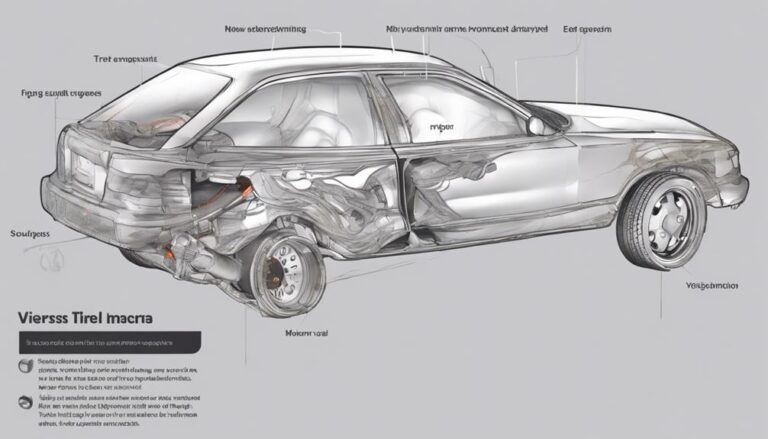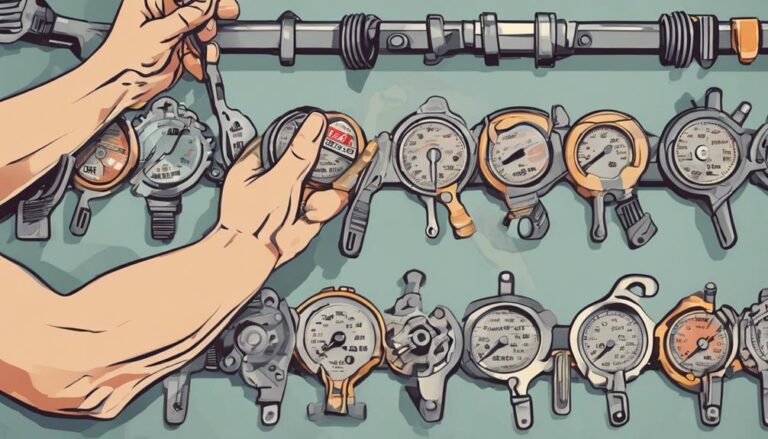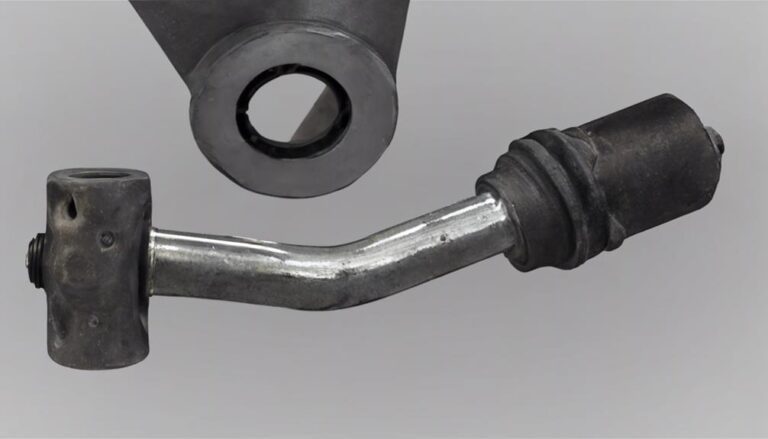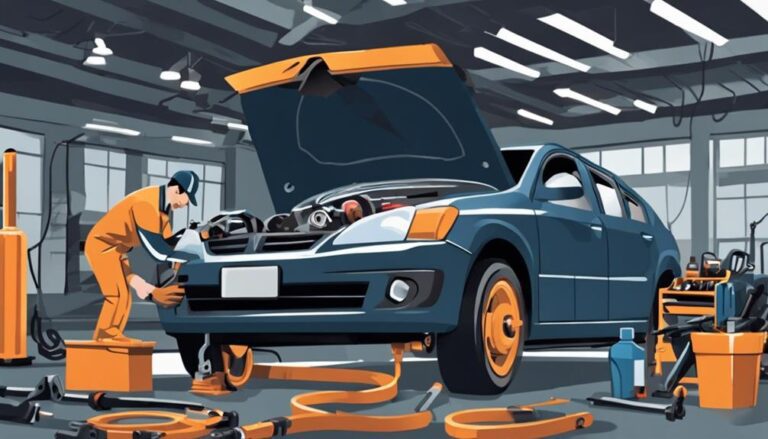Why Is My Steering Wheel Vibrating?
Have you ever felt like your steering wheel is doing a subtle dance beneath your hands? It's not just a quirky feature of your car; that vibration might be a symptom of underlying issues that demand your attention.
Before you dismiss it as a minor inconvenience, consider the potential safety implications and long-term consequences. Understanding the root cause of this unsettling sensation could save you from more significant problems down the road.
Key Takeaways
- Steering wheel vibration may indicate tire-related issues like uneven wear or improper pressure.
- Brake system problems such as rotor warping can cause steering wheel vibrations.
- Wheel alignment challenges like misaligned wheels can lead to steering wheel vibrations.
- Suspension component failures, like worn shocks, can result in steering wheel vibrations.
Tire Imbalance
If your steering wheel is vibrating, tire imbalance could be the culprit, especially when driving at higher speeds. Tire imbalance occurs when there's a variation in weight distribution among the tires, leading to vibrations and shaking. This imbalance can result from factors such as uneven tire wear, improper tire pressure, or irregular wheel rotation. When your tires are imbalanced, it can't only cause discomfort due to the vibrations but also result in wear on your vehicle's struts and shocks over time.
To address tire imbalance, one effective solution is to perform wheel balancing. This process involves adjusting the weights on your wheels to ensure even weight distribution, thus eliminating the vibrations caused by tire imbalance. By addressing tire imbalance promptly, you can significantly improve your driving comfort and stability. Regularly checking your tire pressure and ensuring proper wheel rotation can also help prevent tire imbalance issues from occurring. Remember, maintaining balanced tires is crucial for a smoother and safer driving experience.
Brake Rotor Issues
When experiencing vibrations in your steering wheel, be alert to potential brake rotor issues, such as warping or uneven wear, which can cause shaking while braking. Promptly attend to these issues to maintain safe braking performance. Here are some key points to consider:
- Rotor resurfacing techniques: If your brake rotors show signs of warping or uneven wear, resurfacing them might help restore a smooth braking experience.
- Brake rotor maintenance: Regular maintenance of your brake rotors is essential to prevent issues like vibrations and shaking. Ensure proper installation of new brakes to avoid future problems.
- Timely inspection: Inspect your brake rotors and pads regularly to catch any signs of wear or damage early on. Addressing these issues promptly can prevent further damage and ensure your safety on the road.
Wheel Alignment Problems

Wheel misalignment poses a significant risk to your vehicle's steering stability and overall driving experience. When your wheels aren't properly aligned, it can lead to uneven tire wear. This uneven wear causes the tires to develop abnormal tread patterns, which in turn can result in vibrations felt through the steering wheel. Factors such as driving over potholes or rough terrain can easily knock your wheels out of alignment.
Alignment adjustments are crucial to rectify misalignment issues. If left unattended, misaligned wheels can make your vehicle pull to one side even when you're steering straight. This not only affects your driving experience but also puts unnecessary strain on your tires and steering components. Proper wheel alignment ensures that your vehicle handles smoothly and that tire wear is distributed evenly, prolonging the lifespan of your tires.
Regular checks and adjustments to your wheel alignment can prevent steering wheel vibrations and contribute to a safer driving experience.
Suspension Component Failures
Alignment adjustments play a crucial role in rectifying misalignment issues that can lead to steering wheel vibrations, and the same level of attention is required when addressing suspension component failures.
When it comes to suspension problems, neglecting issues like control arm failure or bushing wear can result in significant steering wheel vibrations. Shock absorber problems and strut damage are also common culprits behind steering wheel shakes, impacting not only the comfort of your ride but also the stability of your vehicle.
To ensure a smooth driving experience, it's essential to address these suspension component failures promptly. Ignoring these issues can compromise your safety on the road and lead to further damage to your vehicle's suspension system.
Remember, a well-maintained suspension system is vital for optimal vehicle performance and your overall driving experience.
- Control arm failure, Bushing wear
- Shock absorber issues, Strut damage
- Suspension springs failure
Steering System Concerns
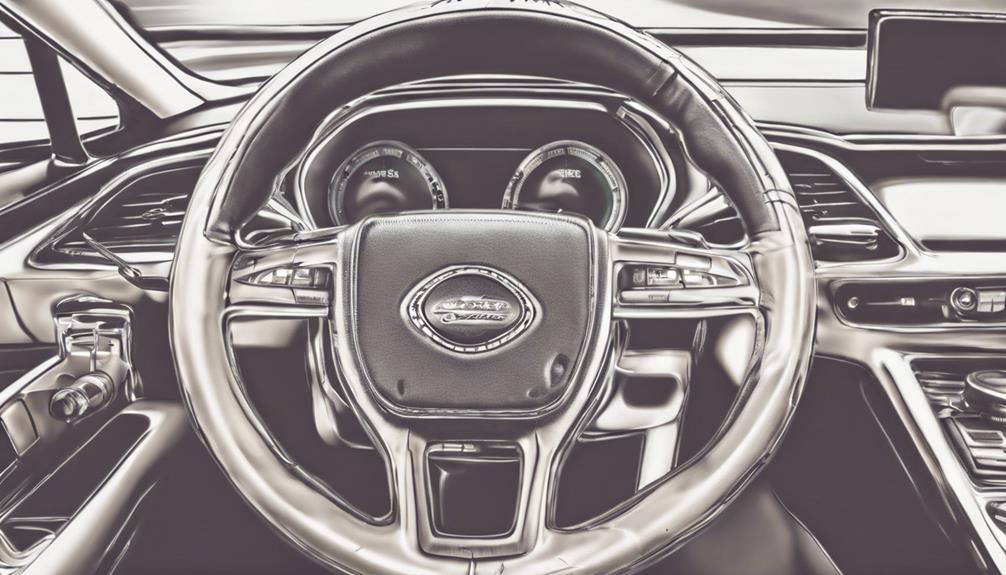
In diagnosing steering system concerns, a thorough examination of potential causes for steering wheel vibrations is imperative to ensure a safe and smooth driving experience. When experiencing steering wheel vibrations, several components within the steering system may be at fault. Here is a breakdown of possible issues:
| Component | Possible Issue |
|---|---|
| Power Steering | Low power steering fluid level or a failing power steering pump can lead to vibrations. Ensure proper fluid levels and address pump issues promptly. |
| Steering Column | A loose or damaged steering column can cause vibrations. Check for any play or abnormalities in the steering column and have it repaired as needed. |
Addressing concerns related to the power steering and steering column is crucial in resolving steering wheel vibrations. By maintaining the power steering system and inspecting the steering column for any faults, you can enhance the safety and performance of your vehicle. Remember, a well-functioning steering system is essential for a comfortable and controlled driving experience.
Frequently Asked Questions
What Causes Steering Wheel to Vibrate While Driving?
When driving, a vibrating steering wheel can be caused by issues like wheel misalignment affecting tire balance. It's crucial to address these problems promptly to maintain your vehicle's stability and prevent further damage.
How Do You Fix a Vibrating Steering Wheel?
You fix a vibrating steering wheel by ensuring precise wheel alignment and tire balance. Address these issues promptly to restore smooth driving. Ignoring them can lead to further complications and affect your driving experience.
Is It Safe to Drive With a Shaking Steering Wheel?
Driving with a shaking steering wheel poses safety concerns and compromises vehicle control, potentially leading to accidents. Immediate attention is crucial to ensure safe driving. Ignoring this issue can result in further damage and risks.
Why Is My Steering Wheel Making a Shaking Sound?
Your steering wheel may make a shaking sound due to issues with steering wheel alignment and tire balance. Ensure proper alignment and balance to minimize shaking. Addressing these factors promptly can enhance your driving experience.
Conclusion
So, if you're experiencing a vibrating steering wheel, it's crucial to address the underlying issues promptly to ensure your safety on the road.
Neglecting these issues can lead to further damage and compromise your vehicle's performance. For example, imagine driving at high speeds with a misaligned wheel causing vibrations that make it difficult to maintain control of your vehicle.
Don't wait until it's too late – get your steering wheel checked by a professional mechanic today.



